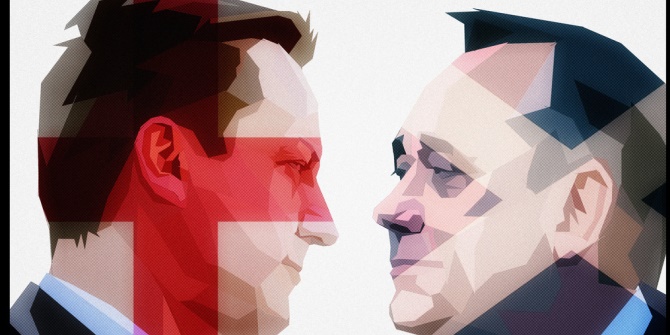 Michael Gove’s redeployment is the most significant ministerial change in the Cabinet reshuffle. Having once been seen as a future leader, Gove seems to have fallen from favour. Although often controversial and divisive, Gove leaves a significant legacy in education policy. In this blog, Mark Goodwin gives three reasons why Gove has been relieved of his duties.
Michael Gove’s redeployment is the most significant ministerial change in the Cabinet reshuffle. Having once been seen as a future leader, Gove seems to have fallen from favour. Although often controversial and divisive, Gove leaves a significant legacy in education policy. In this blog, Mark Goodwin gives three reasons why Gove has been relieved of his duties.
The typical Cabinet reshuffle is a kind of transfer deadline day for politics obsessives. Within the Westminster village, reshuffles are big news, but the low stakes involved rarely inspire much interest beyond this. The current reshuffle, while not quite qualifying as Cameron’s ‘Night of the Long Knives’, has been far from the typical Cabinet reshuffle. William Hague has been the biggest beast to depart, yet his resignation was widely expected. The transfer of Michael Gove from education to chief whip was anything but expected and is the most significant ministerial change in the current cull. Gove had once seemed destined for the great offices of state but it is difficult to see his change of role as anything other than a demotion. Social media reaction has ranged from surprise (pundits), to delight (teachers), to dismay (most Conservative sympathisers). Gove has been one of the most outspoken, most high-profile, most active, and one of the longest serving, education secretaries since the post was founded and he will leave a significant legacy in education policy. Given all this, what explains the decision to relieve him of his ministerial briefcase? Here are three possible explanations:
1) Everyone hates him
Or at least, those who don’t love Gove – and there are plenty in the Conservative party and among its supporters who do – tend to be less than effusive in their assessment of his personal and professional qualities. Gove apparently went out of his way to cultivate this public profile, seeming to regard hostility from the teaching profession in particular as a badge of honour, whether he was railing against ‘the Blob’, the ‘Trot conspirators’ opposing academy conversions, or responding to last week’s strikes by claiming that the only opposition to his reform programme comes from bad teachers and ideologues. Both the NUT and the more moderate ATL union passed motions of no confidence in Gove, and unflattering cardboard effigies of the education secretary (and interestingly, not the prime minister), were ubiquitous on the many strikes and demonstrations during his term of office. To his supporters, Gove was boldly standing by his principles in the face of the vested educational interests that had also preoccupied his Labour predecessors. To everyone else, he was tilting at windmills, and thoroughly alienating the profession he was charged with managing in the process. His removal from the education brief suggests that the party leadership has ultimately been converted to the latter view, preferring not to enter an election campaign with such a toxic figure as the face of one of its major areas of non-austerity reform. Gove always took inspiration from both Blair and Thatcher: from Blair he took the top-down centralising school reform agenda, the highly personalised style and the academy school model; from Thatcher, the view of politics as a crusade, the unshakeable certainty in the rightness of his principles, and the view of those who disagreed as enemies to be crushed rather than reconciled. Like Thatcher, Gove was able to win many victories over his detractors until his own side eventually rounded on him.
2) He can’t stay out of trouble
Gove has always maintained a high media profile for a minister in a mid-ranking department and, as with his deliberately divisive style, this proved to be a double-edged sword. While most government departments were left with little to discuss in public beyond cuts to budgets and services, Gove was able to fill the void with an extensive, ambitious, and more-or-less revenue-neutral programme for school reform. The rapid expansion of the academy schools programme (from 203 schools in May 2010 to nearly 3000 by the time of his departure) represented a significant achievement and probably Gove’s most durable legacy. Yet it also provided the government with a good news story amongst the austerity gloom. However, Gove’s stridency combined with high media exposure was often a dangerous combination and both Gove and his department frequently became embroiled in needless ‘silly season’ news stories (whether on the interpretation of Blackadder, on the teaching of ‘British values’ in schools , or on purging education quangos of those not signed up to the Gove vision) and internal government quarrels.
While there are reasons for Gove’s demotion that concern policy and performance, it seems likely that two rows in the space of a month with fellow government ministers played a major part in the reshuffle decision. First, Gove was required to make a public display of intra-coalition affection after a contretemps with Schools minister David Laws over free schools and free school meals, before a repeat performance having incited a spat with Home Secretary Theresa May over allegations of religious extremism in Birmingham schools (an inquiry into which due to take place tomorrow has now been postponed). The government will be hoping that Gove’s replacement will be more malleable and produce fewer headaches for the party management.
3) His policies either failed, or worked too well (depending who you ask)
The initial spin provided on Gove’s redeployment was keen to insist that the education reform programme was not being abandoned. On the contrary, the Gove reforms were now so thoroughly embedded that the architect of the reforms no longer needed to be present to oversee their ongoing implementation. While this might stretch credibility a little, there is a grain of truth in the claim. When Kenneth Baker introduced standardised testing and a national curriculum in 1988, the proposals were at least as controversial as anything Gove has introduced, yet they are now unchallengeable pillars of the education mainstream. Aspects of Gove’s reforms seem likely to follow a similar path. Academy schools have moved from a significant, but small-scale intervention at the margins of the system to the default model for all schools, to the point that it is no longer conceivable that any incoming future government would seek to reverse this shift. The controversial curriculum reform process has weathered accusations of over-prescription, ignoring the voice of the profession and prioritising rote learning of facts over the application of knowledge and will be introduced. Again, no incoming government is likely to have the appetite for another round of curricular review in the near future. Hence, in the area of the structure of the school system, and the curriculum (including the introduction of phonics testing), Gove seems likely to leave a lasting legacy.
The picture on free schools is less clear. The attempt to create a critical mass of schools to sustain this policy over the longer term has not definitively succeeded (there are at present 174 free schools within a system of 20,000) and high profile failures such as the al-Madinah school and Discovery New School may have compromised the model. Time will tell whether free schools follow the path of academies or of consignment to the dustbin of education policy history as were city technology colleges and grant maintained schools before them. In other areas such as qualifications reform (including the botched English Baccalaureate Certificate proposals, and changes to GCSE exams), performance related pay, the use of unqualified teachers and changes to teacher training, the reforms seem less secure, and may be whittled away in the event of a Conservative defeat next May. It seems unlikely that future governments will reverse the changes to teacher pay and pensions introduced under Gove. Yet, given the impossibility of employing Labour’s strategy of pacification through increased investment, his failure to engage the profession, and indeed an apparent wish to provoke teachers at every opportunity appears to have been a tactical error. Gove may have relished his role as hammer of the unions a little too much, to the extent that he is now required to carry the can for pay cuts and pension reforms whereas a more conciliatory figure may have survived.
Gove was often described as a divisive education secretary. Despite managing to unite the teaching profession (albeit against him), this seems to be the key to his demotion. The appointment of a new-intake, first-time minister as his replacement indicates a strong preference for a much lower profile from the DfE, which was beginning to become a problem department for the government in the run-up to the election. Gove may now be seen as an electoral liability, but his influence on education policy will continue to be felt for some time to come.
Note: This article gives the views of the author, and not the position of the British Politics and Policy blog, nor of the London School of Economics. Please read our comments policy before posting. Image credit: Policy Exchange
 Mark Goodwin – University of Cambridge
Mark Goodwin – University of Cambridge
Dr Mark Goodwin is Mellon Fellow in Public Policy in the Department of Politics and International Studies at the University of Cambridge. He has published research on schools policy, science policy, conscience issues in British politics, and Parliamentary scrutiny. He tweets at @MarkRGoodwin.







